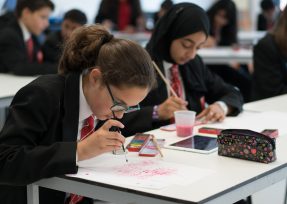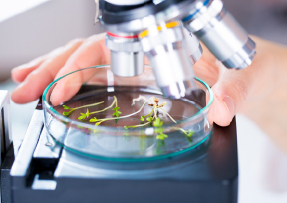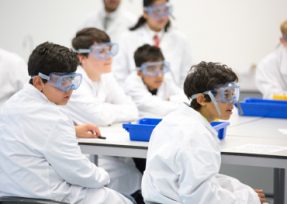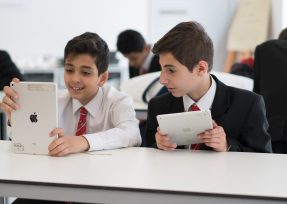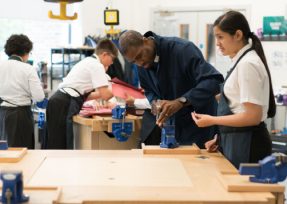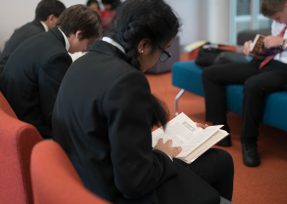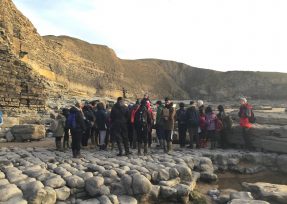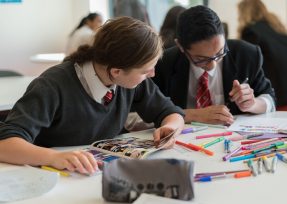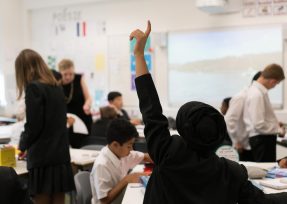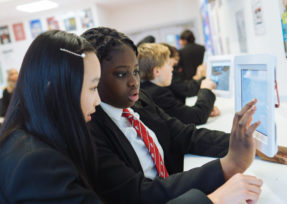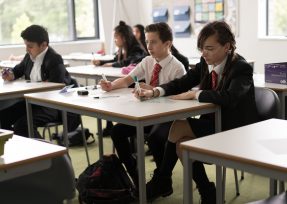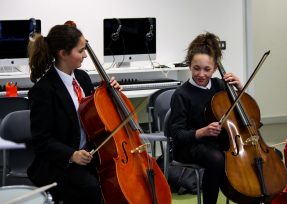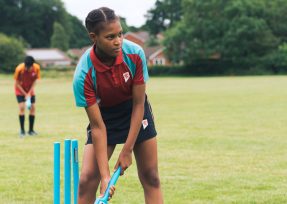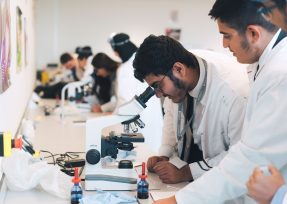Religious Studies
Religious Studies
Religious Studies at University of Birmingham School is about much more than learning about religions. We will learn from people of faith and people with no faith, we will explore and evaluate message of peace and harmony as well as some of the darker sides of faith and politics and above all, we will grow together as a curious learning family prepared to lead the worlds of today and tomorrow.
Religious Studies must be an integral part of all young peoples’ studies and adult daily life. Our modern globalised media can seem to delight in seeing “differences” between people as a battleground that sells stories, however it is much more important to see the spaces between different worldviews as a fertile ground for growth.
Above all, we aim to enjoy our learning, challenge our own preconceptions and become inclusive, sensitive and fair minded pupils and students of the future.
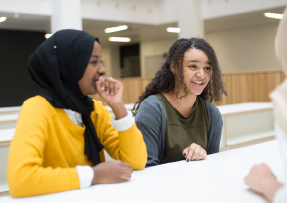
Course Description.
The story of our learning
In Religious Studies we love story telling and use it as a key tool in classrooms. So let me tell you a short story…
The 11 year old came to secondary school knowing bits and pieces about people who wear different clothes, eat different food and do different actions about different gods. They spent a year getting to know two religions in lots of detail, understanding that religion isn’t just about what people wear, eat and do, but is also about community, identity and values. During this year we considered what binds communities together as well as how people might be different in communities, how we interpret our history and holy texts, and how we use reason and revelation to produce community rules and values.
When they turned 13, they had come to understand that there are lots of different people that wear the badge of one religion, appreciating that Sikhs, Muslims, Jews, Christians, Buddhists and Hindus might practice their faith in different ways. We came to know our Birmingham community in a bit more detail, visiting places of worship across the city and meeting people who might be different to ourselves. The biggest questions we explored were “how can we be the same but different?” and “what is a religion?” as we became more discerning and nuanced in our study of religion.
At GCSE options time, the 14 year old had been inspired by the big philosophical and ethical questions that they’d been debating. They were hungry to know more and dig deeper into the intersection between science and faith, how religions remember their history and how scripture and tradition apply to the modern day. They remembered how their brains ached with big questions of free will, evil, predestination and God, and wanted to know more about Christian and Islamic theology. Some of their friends’ passions lay elsewhere and for those pupils their Religious Studies journey didn’t continue with GCSE study, but through enrichment, personal learning and development and Character Education.
By the time it came to choosing A Levels, the 16 year old had a tremendous brain and was becoming very thoughtful, but wanted more of a challenge in unpicking the tricky and controversial aspects of Religious Studies. They chose to continue their studies and wanted to explore so they chose to explore whether there was a soul, what is real and tried to resolve that debate about God’s omniscience and eternity from way back in year 9. Their lessons were full of questions about ethical business conduct, moral questions at the end of life and application of ethics to sex and relationships. They felt Religious Studies come to life around debates to do with gender and the Church, whether Marxism can be a legitimate tool for theological exploration and how different religions and atheism can live alongside one another in British society.
By this point the questions had become far too big and intense for one mind to manage so the 18 year old had to go out into this vast and exciting world to find more brains to pick and questions that needed exploring, so considered being a theologian, philosopher, sociologist, psychologist, artist, literature scholar, lawyer, politician, journalist, linguist, scientist, economist… all from the humble beginnings in their first RS lesson when we asked them, “what is religion all about?”
Examination pathways
We run two examination groups: GCSE Religious Studies and A Level Religious Studies. For GCSE we have selected to offer WJEC/Eduqas, route A and our component 3 option is Islam. This means that at GCSE we spend half of our time studying issues of relationships, life and death, good and evil, and human rights from both Christian and Muslim perspectives. A quarter of our time is an in depth study of Christian beliefs and practices, and the final quarter is an in depth study of Muslim beliefs and practices. Our GCSE curriculum map is designed to interleave these topics throughout year 10 and 11 to support pupils in making meaningful connections between content, review topics regularly and support with long term memory.
For A Level we have selected to offer OCR Religious Studies, with Christianity as our chosen religion for developments in religious thought. We chose this because with the reformed GCSE specifications we can guarantee that every child with a Religious Studies GCSE has studied Christianity as this is now a mandatory element of GCSE study. A third of the A Level is spent on philosophy of religion, a third on religious ethics and a third on developments in Christian thought, with the course divided into first and second year content as AS and A Level years would be, although we only offer the A Level examinations.
Key Information
Department
Religious Studies
Subject Leader
Miss H Moore
Contact
Admissions enquiries
e: admissions@uobschool.org.uk